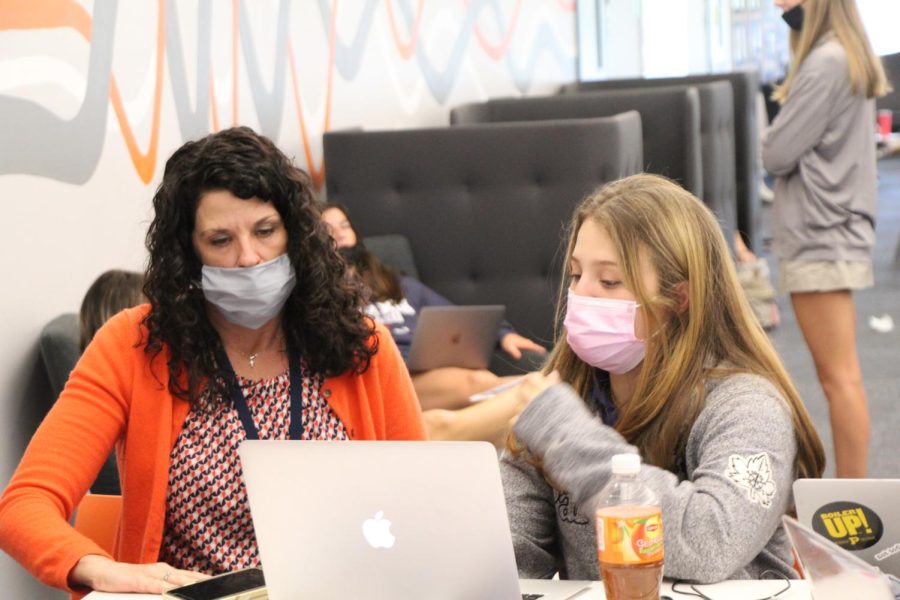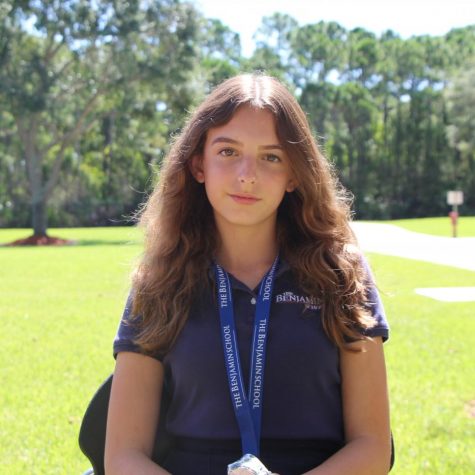Upper School Yearbook: A Real Treasure
Print Productions instructor, Mrs. Kristen Hewitt, collaborates with sophomore yearbook staff member, Zoey Cooper about her page design. Students in the class produce Treasures, our yearbook. The class is a full-year course in the arts and innovation department and is open to students in all grade levels.
February 11, 2022
ny classes as part of its academic curriculum. One such class that has been a part of Benjamin for years is Print Publications, which produces the yearbook. The class never ceases to amaze students and faculty with its hard work.
The Print Publications class and its leader, Mrs. Kristen Hewitt, work diligently to produce the annual upper school yearbook, Treasures. The book chronicles the moments, events, and remarkable student achievements that shape the year.
Lauren Straub, a senior editor on the yearbook staff, identified some of the many reasons she finds the class enjoyable: meeting and conversing with other students as well as being able to capture the school year in a book.
“My favorite part of the class is really just getting to document the school year as a whole so we are all able to look back on it years from now and remember high school. I also love that it allows me to speak to most of the students in the school through interviews that I otherwise would not have gotten the chance to. Another thing I like is that the class works just like an actual job would with us all working together and documenting the year,” Straub said.
Senior Caelan Brindise points out that her research enlightens her to different school activities and allows her to talk to interesting individuals.
“My favorite part of the class is finding out more about the different activities going on in the school and gathering the unique stories about my peers that other people may not know about,” says Brindise. It is a good way to become more involved and to be in touch with the school and all of its happenings,” Brindise said.
“I would definitely recommend taking yearbook for many reasons. Mrs. Hewitt is a great, understanding teacher who helps each and every student to the best of her ability. Yearbook is such a fun class that allows you to use your creativity to make amazing designs and share your work with the whole school,” said senior Ella Hayes.
Brindise explains her favorite parts of the class is that it gives her the opportunity to express her creativity.
“I think my favorite part of yearbook is probably the creative freedom. It is really cool to be able to create something and be able to share it with the entire school,” said Brindise.
Though she loves the class, Hayes does explain that it is not necessarily easy. Yearbook staff sends out survey emails often for students to fill out for yearbook content, but getting responses can be a difficult task. It is almost unanimous that this is the hardest part of the class; getting students engaged.
“The most difficult part of working on the yearbook is getting participation from the students not in the yearbook. Some students are reluctant to answer our emails or do interviews which makes our jobs a lot harder at getting the right information on each spread and trying to include every single student in the school,” said Straub.
Sophomore Bryn Feldman and senior Olivia Beam agree on the topic, proving it to be true that the majority of the class finds this to be the hardest task.
“The most difficult part of yearbook is by far getting people to respond to emails. Whether it is student or faculty its hard to know whether people are getting your emails if they dont acknowledge them. A majority of yearbook’s spreads are dependent on the input from students and faculty and only a very small majority of people at school actually read and respond to their emails,” says Feldman.
“The most difficult part of working on the yearbook is the lack of response from the student body,” said Beam.
Straub describes what exactly the class entails, and how the work is completed.
“During class we work on our spread assignments, which are the pages for the yearbook. We are able to work on them in and out of class, but in class, we take the time to peer review and help each other with our spreads,” said Straub.
“I usually work on my spread or help someone else with their spread,” says Brindise.
Print Publications class is a wonderful opportunity to get to know and bond with other students in the class, learn more about school events and activities, improve writing skills, and interact with other students in the Benjamin community to learn more about what’s interesting in their life. The class requires dedication and passion, but is able to express student’s interests and creativity in doing so. If you’re interested in joining next year, please see Mrs. Hewitt to discuss the opportunities that await.



